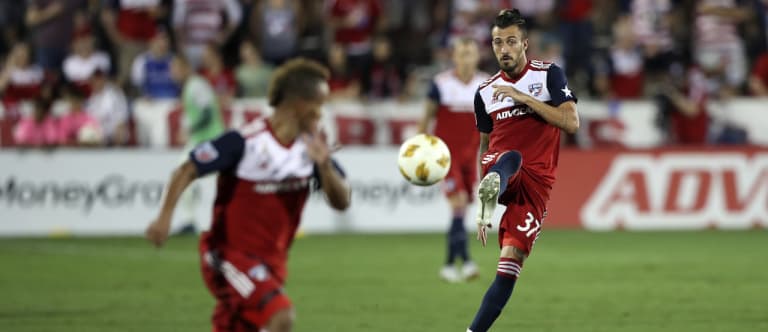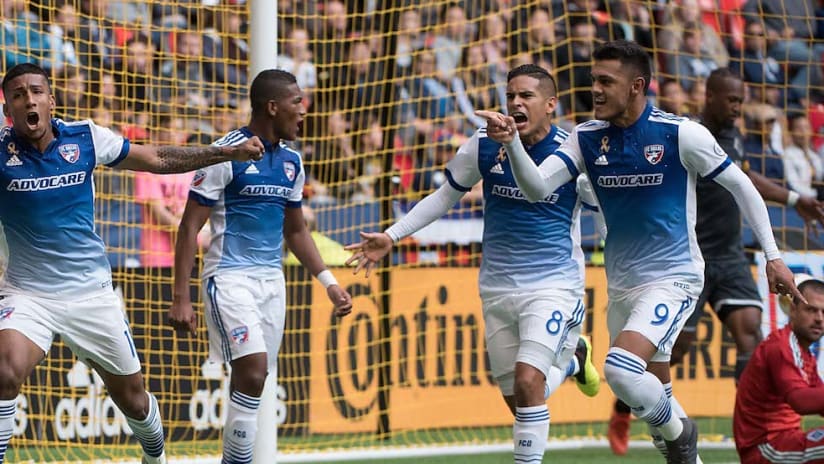Some of the faces have changed, but on the surface, this FC Dallas team looks strikingly similar to the groups that had so much regular-season success in 2015-16.
Like those two teams, which finished first in the West in 2015 and took home the Supporters’ Shield the following year, the current FCD squad has been at or near the top of the conference all season. Their 2-0 victory against Orlando City SC on Saturday gave them 57 points with three games remaining in 2018, putting the club’s all-time single-season record of 60 points (set in '15 and tied in '16) very much in play. They’re in the same neighborhood as those squads in goals scored and goals conceded and also primarily play out of a 4-2-3-1.
Dig a little deeper, however, and changes – some dramatic, some subtle – quickly become apparent for Dallas, who are 3-0-2 in their last five. Without causing much of a shift in FCD’s standing, the club feel the changes have given them far more options heading into the playoffs than they had in either of the two previous appearances, when they were bounced in the conference finals and semifinals, respectively.
“I think we have become more flexible this year,” head coach Oscar Pareja told MLSsoccer.com over the phone on Tuesday. “This team has gained some variety with what we have in the models, in the formations. We’ve learned how to play without players that were regulars in our group, we developed some different ways to win this year, we have adapted much more to the different challenges that we have had during the journey. We have to get more in the playoffs, but the team this year has been more flexible than in the past.”
Dallas’ highest-profile changes, as Pareja referenced, have been departures. Center back Walker Zimmerman was traded to LAFC in the offseason, playmaker Mauro Diaz was sold to Emirati club Shabab Al-Ahli on July 3 and former Homegrown and current US national team midfielder Kellyn Acosta was shipped to Colorado three weeks after Diaz’s transfer.
The Zimmerman and Acosta departures were significant, but didn’t seem to affect how FCD play. Dallas signed Swiss veteran Reto Ziegler this winter to replace Zimmerman; he’s been excellent, pairing with center back Matt Hedges to lead a defense that is tied for third-fewest goals allowed this year. After an early-season injury, Acosta wasn’t starting full-time before his trade; FCD replaced him in-house with Victor Ulloa.
The loss of Diaz proved a bigger shock to the system. The Argentine has terrific vision and is excellent at playing the final ball, which led to FCD running a lot of their attacking movements through him. That often worked wonderfully (despite playing his last game for Dallas on June 9, Diaz is still second on the team with 8 assists), but it created a dangerous dependence for FCD: If Diaz was cooking, Dallas often rolled; if he were injured or off his game, things could become a grind.

Maxi Urruti's move to the No. 10 has helped fill the void left by Mauro Diaz's departure. | USA Today Images
Since Diaz left, FCD have become a bit more diverse and a bit more direct in the attack. Maxi Urruti has dropped from his forward spot into Diaz’s old role in the midfield and has been fantastically productive, 21-year-old summer signing Pablo Aranguiz has shown flashes in the final third and wingers Michael Barrios and Santiago Mosquera have combined for 11 goals and 5 assists since July 28.
Regardless of who’s playing the final ball or hitting the back of the net, Dallas have increased the pace of their attacks since Diaz’s departure. As Bobby Warshaw noted in his column earlier Tuesday, they’re now hitting teams more on the fly, with Ulloa and Carlos Gruezo winning the ball in the midfield, finding an outlet in Urruti or a winger and moving the ball toward goal as quickly as they can.
“We had a big loss with Mauro,” Ulloa said. “The type of player he is, the kind of impact that he has on the team, we were looking for him every ball, especially the midfielders. We were trying to get it to him because he’d make the magic happen. Now, with Maxi in there, I think he’s done a phenomenal job. Different type of player, more direct, but we’re adjusting to the new role that he plays in our team and I think we’ve done pretty well.”
Pareja has also shifted his attackers around. In addition to dropping Urruti into a deeper role, Pareja has used him out wide and, occasionally, kept him up top. Barrios and Mosquera have both seen time at forward. Aranguiz has played in the middle and as an inverted winger. Roland Lamah, still FCD’s leading scorer with 8 goals, hasn’t played much during the last two months due to injury, but he recently returned to the 18 and gives Pareja another option at forward or winger.
Pareja has also used different formations more frequently this season, something Dallas didn’t do much of in past years.
The increased directness, the flexibility in formations and personnel have combined to leave Dallas in an intriguing place headed into the postseason. They’re hot, confident and, despite the raft of changes, feeling a little more secure.
“When teams get hot at the right time, it’s huge,” Ulloa said. “At this moment, we’re happy with where we are at. We’ve just got to keep it going so we go into playoffs with high spirits and ready to make a run for the Cup.”













